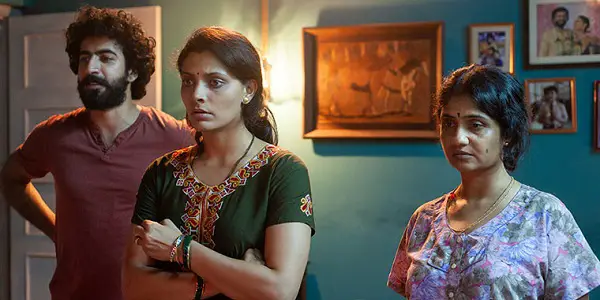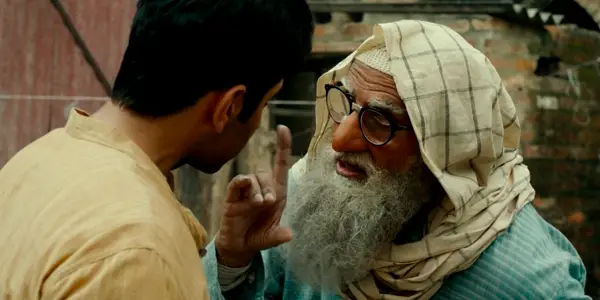Bollywood Inquiry June 2020: CHOKED, BULBBUL, GULABO SITABO

Musanna Ahmed is a freelance film critic writing for Film…
Bollywood Inquiry is a monthly column on the biggest new Bollywood movies. However, due to the COVID-19 pandemic, I haven’t written a Bollywood Inquiry column since February. Theatrical releases may have come to a halt but streaming services came to save the day and, in turn, offer me a return to this column this month.
Within Hollywood we saw the delays of major films such as No Time to Die, Tenet, and Mulan, and the Bollywood equivalents include a biopic of India’s Cricket World Cup victory (83), the third entry in a star-studded action cop series (Sooryavanshi), and an Akshay Kumar-starring comedy horror (Laxmmi Bomb) which was recently confirmed to be one of seven big Hindi films that will premiere on the recently launched streaming service Disney+ Hotstar, a joint effort between Disney and Star India’s pre-existing streaming service.
However, none of the three films reviewed here were viewed on Disney’s platform, with the first two being Netflix Originals and the third an acquisition by Amazon Prime Video. Quite interestingly, whilst all three films offer a certain type of spectacle, none of them have the usual pizzazz that only suffices on the big screen, so there’s a certain vindication in them being exclusive to our homes, especially during the time of lockdown. Here are my reviews of Choked, Bulbbul, and Gulabo Sitabo.
Choked (Anurag Kashyap)
My favourite maverick filmmaker Anurag Kashyap returns with another film in which he plays by his own rules, aesthetically, narratively and ideologically, refusing to follow expectations set by anyone other than himself.
Choked is a gripping critique of the demonetisation that rocked India a few years ago. For those who don’t know, the Government of India elected to demonetise 500 and 1000-rupee banknotes in a movie that Modi said would help curb illegal finances. The move was controversial, disrupting the economy as large queues for currency exchange formed outside the banks, who were suffering from cash shortages, exacerbated by the tight window of time that citizens had to exchange their notes. The jury’s still out on the ultimate impact demonetisation had on the economy, with many short-term effects already seen, positive and negative, and long-term ones yet to be determined.

Saiyami Kher, one to watch) who discovers a seemingly endless supply of cash in her bathroom drain. A previous tenant is shown to be inexplicably stuffing the large swathes of cash (likely earned through crime) down the drain early on in the movie and, fortuitously, Sarita discovers the bundles resurfacing one night when going to the bathroom. It becomes a ritual of hers to wake in the middle of the night, run to the bathroom, and collect her treasures.
As the tireless breadwinner of the house – her husband Sushant (Roshan Mathew) is an irresponsible gambler who owes a lot of money to people – it’s the best thing to happen to Sarita, as she pays off her other half’s debts and furnishes the home with quality items with her newfound wealth, making the end of her long working days feel so much better. All of it comes to a halt when demonetisation is announced: her money is now devalued and her work at the bank, facing hundreds of angry and anxious customers every hour, threatens to break her spirit.
If you have ever followed Kashyap’s Twitter – which he temporarily deactivated after a certain recent day in India’s democracy – he’s made it no secret that he’s opposed to Modi’s policies or, at the very least, how they’ve been implemented. This narrative is a microcosm of how Kashyap saw demonetisation affect people: families started crumbling, the job market grinded to a halt, and those customers who were angry with their service at the bank were pissed off at the wrong people. Never is the text more blunt than when Sarita says to one frustrated client, “Please, don’t do this to me. Get help from the people you elected.”

Saiyami Kher is a star in the making. Her eyes are a direct tunnel into her character’s hopes and fears – when Kashyap employs a recurring visual motif that begins with closing up on her eyes in the dead of the night, you can ascertain how rapturous her discovery is and what the implications are. It’s a formally slick movie, with the snapping close-ups recalling the dynamism of Edgar Wright and Danny Boyle. I’ve always enjoyed how Kashyap experiments with different shooting methods for each of his stories, from the CCTV POV’s in Black Friday to the long Scorsese-esque tracking shots of his crime masterpiece Gangs of Wasseypur.
Boyle is a spectre in this movie – not only does the fast-cut aesthetic remind us of him but the narrative contents are a little bit Shallow Grave and a little bit Millions. Ultimately, though, it’s the realism in the dialogue, the incisive casting choices, and the deep engagement with relevant social and political themes that make Choked so wholly an Anurag Kashyap movie. Another distinct entry in his wonderfully varied filmography.
Bulbbul (Anvita Dutt)
There’s a nice wave of high-concept genre films coming out of India in recent years. Two highlights, for example, would be the action movie Jallikattu, in which an attempted buffalo slaughter goes over-the-top, and Tumbbad, a visually rich folk horror revolved around a hidden treasure. Whilst Bulbbul doesn’t fulfil the potential we’ve seen out of the country’s genre film scene, it’s still a lush and disturbing hybrid of folk-horror and fairytale.
We begin in 1881 during the Bengal Presidency, in the bubble-wrapped village that seems to be free from any social, cultural or political concerns. We’re presented with vivid colours that surpass the limitations of your non-HDR televisions and a sweet period-appropriate score to underscore the carefree days of Bulbbul and Satya, two kids who like each other and assume they’ll marry one another. Except Bulbbul becomes a child bride when she’s arranged to marry an older man, Indranil, who co-exists with his mentally ill twin brother Mahendra (Rahul Bose effortlessly plays both siblings) in a stunning haveli (mansion).

Twenty years later, Bulbbul (Tripti Dimri) is now the thakurain – a noble title used to describe a landlord – of the gorgeous house, far removed from the ball of optimism she was when she was young, instead devoting her energy to essentially enjoying an early retirement from the world around her. Satya (Avinash Tiwary) returns to London after two decades and is surprised at Bulbbul’s change of character and further confounded by the string of mysterious male deaths and disappearances that have plagued the village – two of whom include Mahendra and Indranil.
As the film unwinds its mythology-driven plot – the belief that a chudail (essentially a diabolical revenant woman) is responsible for the deaths of the men – it plays its hand too early by guiding Dimri’s performance a certain way. The emerging actress gives a fine turn as the titular character but the script doesn’t trust the audience to spell things out for themselves, broadly telegraphing the big reveals before we get to them through dialogue that’s too on-the-nose, hurt further by the use of a non-linear structure where flashbacks only confirm narrative information rather than surprise.
As a feminist tale, Bulbbul is highly suspect. The heroine’s journey, from a young girl whose destiny is controlled by the older men in her life to ruling as the queen of her own free world, is somewhat cliché. What further damages the theme of growth is when the film veers into rape-revenge territory and plays like I Spit On Your Grave only if it was directed by a more fastidious craftsperson.
Craft – that’s the USP of Anvita Dutt’s first movie. She displays an extremely strong visual flair, working with her brilliant cinematographer Siddharth Diwan to glide the camera around Bulbbul’s opulent world (excellently realised by production designer Meenal Agarwal) and the enigmatic characters within it, and painting the frame with a striking scarlet palette for the night sequences. The phenomenal Amit Trivedi understands better than most of his peers on how to score a period horror film, making an indelible theme song with his orchestra. Whilst the storytelling may not succeed on a script level, the images and soundscapes of Bulbbul provide great impetus to give it a watch. Not bad for a debut.
Gulabo Sitabo (Shoojit Sircar)
The most “Bollywood” one of the three films here and honestly the least impressive one. It saddens me because Ayushmann Khurrana is one of my favourite movie stars in the world right now and you can see in my previous Bollywood Inquiry columns (link at bottom) how much I’ve enjoyed his recent streak of films including Article 15, Bala, and Dream Girl.

Even though all of Khurrana’s string of hits have been helmed by different filmmakers, it seems his commercial influence has seeped its way into the screenplays – the idea is to focus on socially conscious topics and treat them gently, comically. It’s quite disappointing to watch as director Shoojit Sircar and writer Juti Chaturvedi fail to wave the magic wand that made Khurrana’s previous efforts such a marvellous balance of popcorn comedy and message movie, partially because they seem to be playing it too safe, as if to preserve the aforementioned image of what a film with this particular lead actor is expected to be.
This film revolves around the drama of property disputes, pitting a stingy old landlord (Mirza, played by the inimitable Amitabh Bachchan) against one of his mansion’s broke and unreliable tenants (Khurrana’s character Baankey). The premise is ripe with conflict, giving the film an opportunity to play with its characters like Tom and Jerry. Bachchan is game, illustrating his Scrooge-like character purely through physical means, sporting thick glasses, a big beard, a headscarf and a fake nose.
Khurrana delivers his least interesting performance in a long time, unable to dynamise his plainly written vengeance-seeking proletariat who discovers that the key to loosening Mirza’s grip on the mansion may be a government-funded archaeologist who has the power to seize the property and bestow it with heritage status.
The first act in which Mirza and Baankey come to blows is the most entertaining purely because the stakes are presented well enough to convince you that things will escalate to an entertaining extent. But the dramatic potential hit a plateau too early and too hard, making the two-hour film feel three hours, as none of the narrative threads are explored handily enough. What’s worse is that the humour is so slight that, most of the time, it’s plain invisible.
When the final act aimed for poignancy, I felt nothing, not least because a streaming release meant the distractions to save me from boredom were more easily accessible than they would’ve been in a cinema. Gulabo Sitabo just doesn’t provide much to enjoy besides the evergreen cinematic highlight that is Amitabh Bachchan.
Next Month
During the lockdown period, Bollywood suffered three great losses with the deaths of Irrfan Khan, Rishi Kapoor and Sushant Singh Rajput, beloved actors who represented the best in three different generations of Hindi cinema. SSR‘s final film Dil Bechara, an adaptation of The Fault in Our Stars, will be the first to release from the aforementioned Disney+ Hotstar slate, streaming from the 24th July 2020. Check out the trailer below and stay tuned for my review next month.
To read previous Bollywood Inquiry columns, click here.
Does content like this matter to you?
Become a Member and support film journalism. Unlock access to all of Film Inquiry`s great articles. Join a community of like-minded readers who are passionate about cinema - get access to our private members Network, give back to independent filmmakers, and more.
Musanna Ahmed is a freelance film critic writing for Film Inquiry, The Movie Waffler and The Upcoming. His taste in film knows no boundaries.













